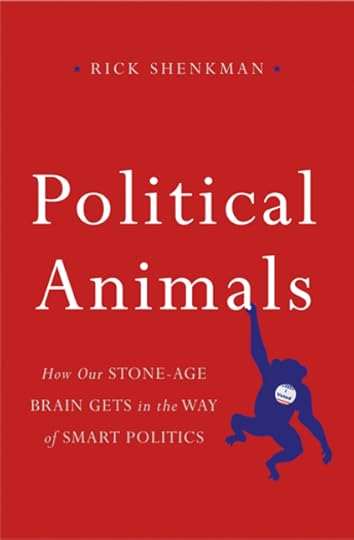The Real Reasons Why We Vote The Way We Do
 We all tend to think our own political views are sound, but that it’s “the others” that are crazy, dumb or both. To get some perspective this election season, I recently read Political Animals: How Our Stone Age Brain Gets in the Way of Smart Politics, by Rick Shenkman.
We all tend to think our own political views are sound, but that it’s “the others” that are crazy, dumb or both. To get some perspective this election season, I recently read Political Animals: How Our Stone Age Brain Gets in the Way of Smart Politics, by Rick Shenkman.
It’s a good and important book. I’d recommend it for anyone trying to understand what is going on in America and to sharpen their own thinking about who to vote for. Kirkus reviews called it “An amiable tour of the socio-scientific evidence that accounts for our political miscalculations” and that’s a good summary.
The book aims at four observations:
Many of us frequently disengage, becoming apathetic.
We often don’t correctly size up our leaders.
We punish politicians who tell us hard truths.
We often fail to show empathy in circumstances that clearly cry out for it.
And the chapters of the book try to answer four questions:
Why aren’t voters more curious and knowledgeable?
Why do we find reading politicians so difficult?
Why aren’t we more realistic?
Why does our empathy for people in trouble often seem in such short supply?
A central theme of the book is cognitive bias, and how our brains are poorly designed for certain kinds of problem solving (e.g. evaluating candidates). Our brains are designed for life 20,000 years ago, and our natural skills for evaluating leaders don’t work very well at the scale of national governments.
We also have great faith in why we make our own choices, despite the powerful evidence we’re mostly irrational and heavily influenced by superficials. We see this flaw more easily in people who vote differently than we do than in ourselves. Shenkman sites many studies that expose the irrational and biased nature of our psychology as it relates to voting. It’s an eye-opening read in many ways, as it’s shocking to read so many stories from American history of our citizen’s absurd and subconscious motivations.
The weakness of the book is it is mildly repetitive at times. It’s well written and provocative, but some points are made multiple times and a tighter edit would have made it a smoother read. Like many books about culture, his arguments depend heavily on social psychology studies, which are easy to interpret in different ways (to his credit the Notes section is a thorough referencing of every study mentioned). It’d be easy to accuse the book of a liberal bias (Nixon and Reagan are used as negative examples), but that would miss the point. Most of his observations and evidence apply to our species in general, rather than a point of view. Swap out some examples and his points still resonate.
“We possess dozens of instincts— perhaps even thousands depending on your definition— and they involve virtually any human activity you can think of. William James, the father of American psychology, held that instincts guide us from birth. He even included crying and sneezing as instincts. You don’t have to be taught to cry or sneeze, after all.”
“The key to understanding how the modern mind works is to realize that its circuits were not designed to solve the day-to-day problems of a modern American— they were designed to solve the day-to-day problems of our hunter-gatherer ancestors. These stone age priorities produced a brain far better at solving some problems than others.”
“Bartels and Achen found, adverse weather conditions cost the incumbent party 1.5 percentage points. In close elections, that could spell the difference between a win and a loss. (More than half of presidential elections since 1900 have been won by five points or less.)”
“How can we tell when we should follow our instincts and when we should not?”
“Our evolved mechanisms, as Michael Bang Petersen points out, are designed to help us evaluate people in our midst. They are less good at helping us evaluate people at a distance. Our natural gifts of reading people are largely neutralized when we are reading politicians. The circumstances in which we get to know them are so artificial, it’s impossible most of the time to get a whiff of the real person beneath the fictional character created for public consumption. We think we know our politicians well. But we barely know them at all.”
“Like most elections, 1980 was a referendum on the past. People generally don’t vote on the basis of what they expect will happen in the future. The future is abstract. The past, in contrast, is concrete. As emotional human beings we respond most forcefully to the concrete. People didn’t vote for Reagan so much as vote against Carter.”
“As the Harvard psychologist Steven Pinker has observed, we don’t want the truth to prevail, we want our version of the truth to prevail.”
“So who paid the most attention? Who, in other words, formed the main audience for the election? This was perhaps the study’s central finding. It was partisans— the people who had already made up their minds. The key audience wasn’t the people who had an open mind. It was the people who had closed minds. They didn’t follow the news to get educated. They followed the news because they found it interesting. The media had virtually no impact on their views. When they heard what they wanted to hear, they cheered.”
Quotes from Political Animals: How Our Stone Age Brain Gets in the Way of Smart Politics, by Rick Shenkman.



